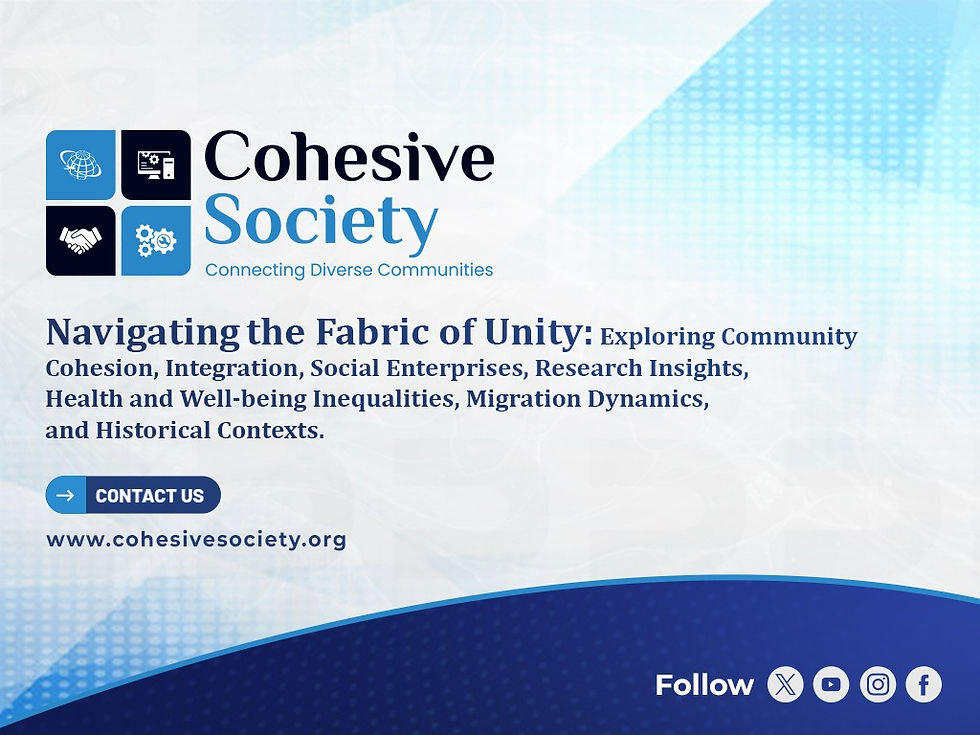BAME employee career progression issues in the UK
- Cohesive Society

- Sep 26, 2022
- 3 min read
Updated: Mar 29, 2024

It can be observed that racism and discrimination continue to impact society and its key institutions, even after the introduction of Race Equality legislation for so many years. The same thing also finds its way into business boards, recruitment procedures, employment, and organisational practices.
Critical findings of the research studies suggest the following:
Considerably, a higher number of BAME employees cited that career progression is an essential part of their career and profession in comparison to the ones from a white British background.
BAME workforces are more probable than the ones from a white British background to mention that experiencing discrimination is an issue.
Extensive research into striking bias against minority ethnic candidates discovered that job seekers from minority ethnic communities needed to send 60% more job applications to receive a similar level of interest in comparison to the ones from majority groups.
Nevertheless, BAME workforces have a higher propensity to say that their career progression has not met their expectations in comparison to white British workforces. BAME workforces within the age group 18 years to 34 years are highly likely to agree that everybody has the opportunity to attain their potential to work, regardless of their identity or background, in comparison to the people aged over 45 years.

BAME workforces are more likely to say that they need to change certain features of their behaviour to go well with others in the workplace, especially the ones of an Indian, Bangladeshi or Pakistani origin.
A government-appointed McGregor Smith Review 2017 observed that there is discrimination and unfairness at different phases of the career of an individual. BAME populations encountered a distinctive lack of role models. They tend to perceive the workplace as intimidating, they are less likely to apply for or even get promotions, and are likely to be judged and criticized more severely.
Another study showed that around two-thirds of the BAME population who reacted to the call for evidence stated that they had faced racial harassment or bullying in the workplace in the past five years.
BAME workforces in the UK are less likely to take part or advance in their place of work, in comparison to white British individuals. Obstacles arise, right from the entry-level to the board level that hinders people from attaining their complete potential. This is not only unjust but also tends to loss of productivity, in comparison to the White British workforces. This can be considered as an underutilization of resources for businesses and influences the entire economy in general.
A research study carried out by the Joseph Foundation revealed that a higher percentage of the BAME population tends to work in comparatively low-paying jobs. The BAME population also struggles to attain the same opportunities for progression in comparison to their White British counterparts. One out of eight people in the working age group and one out of ten people are in the place of work and just one in 16 top management positions are occupied by an ethnic minority population.
To overcome these barriers, workforces can highlight issues regarding inequality and have a view on matters affecting them at work.
Human resource policies and procedures that promote diversity and inclusion can set expectations, however, they need to be regularly assessed with a critical lens and underpinned by principles that actively celebrate and encourage differences. However, policies alone won't bring about change. They need to be brought alive by the demeanor of everyone in the business.
As with employers, policymakers need to understand the factors keeping inequalities in place in different business contexts to be able to take informed action to address and remove them.
There is a clear need for practical guidance and case study examples to kick-start and maintain the employer-led action.
career development plan for employees, employee progression, employee career progression, career progression plan for employees, career progression plan for employees template, employee role in career development, progression plan for employees, career development plan for it employees
Cohesive Society uses a social enterprise model to promote cohesion and integration among marginalised communities.
To learn more about our projects, check here Cohesive Society Projects.
Look through our blog posts to know more about youth integration, the importance of higher education in the UK for BAME YOUTH




Comments